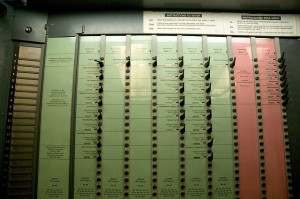An Alternative to Democracy?
With the U.S. presidential election nearly here, everyone seems to have politics on their mind. Unlike most people, economists tend to have an indifference towards voting. The way economists see it, the chances of an individual’s vote influencing an election outcome is vanishingly small, so unless it is fun to vote, it doesn’t make much sense to do so. On top of that, there are a number of theoretical results, most famously Arrow’s Impossibility Theorem, which highlight how difficult it is to design political systems/voting mechanisms that reliably aggregate the preferences of the electorate.
Mostly, these theoretical explorations into the virtues and vices of democracy leave me yawning.
Last spring, however, my colleague Glen Weyl mentioned an idea along these lines that was so simple and elegant that I was amazed no one had ever thought of it before. In Glen’s voting mechanism, every voter can vote as many times as he or she likes. The catch, however, is that you have to pay each time you vote, and the amount you have to pay is a function of the square of the number of votes you cast. As a consequence, each extra vote you cast costs more than the previous vote. Just for the sake of argument, let’s say the first vote costs you $1. Then to vote a second time would cost $4. The third vote would be $9, the fourth $16, and so on. One hundred votes would cost you $10,000. So eventually, no matter how much you like a candidate, you choose to vote a finite number of times.
What is so special about this voting scheme? People end up voting in proportion to how much they care about the election outcome. The system captures not just which candidate you prefer, but how strong your preferences are. Given Glen’s assumptions, this turns out to be Pareto efficient — i.e., no person in society can be made better off without making someone else worse off.
The first criticism you’ll likely make against this sort of scheme is that it favors the rich. At one level that is true relative to our current system. It might not be a popular argument, but one thing an economist might say is that the rich consume more of everything – why shouldn’t they consume more political influence? In our existing system of campaign contributions, there can be little doubt that the rich already have far more influence than the poor. So restricting campaign spending, in conjunction with this voting scheme, might be more democratic than our current system.
Another possible criticism of Glen’s idea is that it leads to very strong incentives for cheating through vote buying. It is much cheaper to buy the first votes of a lot of uninterested citizens than it is to pay the price for my 100th vote. Once we put dollar values on votes, it is more likely that people will view votes through the lens of a financial transaction and be willing to buy and sell them.
Given we’ve been doing “one person, one vote” for so long, I think it is highly unlikely that we will ever see Glen’s idea put into practice in major political elections. Two other economists, Jacob Goeree and Jingjing Zhang have been exploring a similar idea to Glen’s and testing it in a laboratory environment. Not only does it work well, but when given a choice between standard voting and this bid system, the participants usually choose the bid system.
This voting scheme can work in any situation where there are multiple people trying to choose between two alternatives — e.g., a group of people trying to decide which movie or restaurant to go to, housemates trying to decide which of two TV’s to buy, etc. In settings like those, the pool of money that is collected from people voting would be divided equally and then redistributed to the participants.
My hope is that a few of you might be inspired to give this sort of voting scheme a try. If you do, I definitely want to hear about how it works out!


Comments